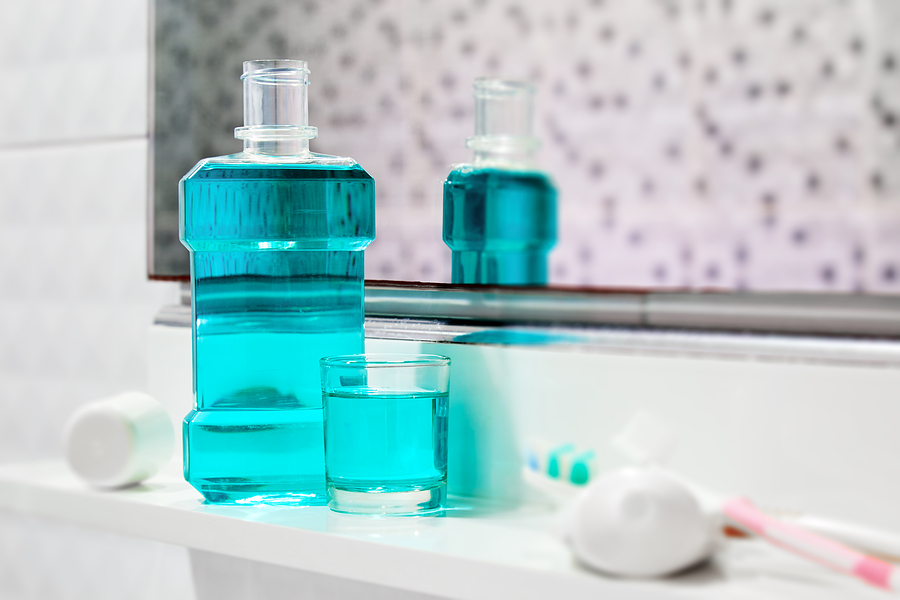Although it should never be viewed as a substitute for brushing and flossing, mouthwash can be a useful addition to your oral hygiene routine. That said, many people have concerns and questions about whether oral rinses are appropriate or effective. Here are some answers to many common questions about mouthwash.
Why Use Mouthwash?
Just like interdental brushes, dental floss and water flossers, mouthwash is good at getting in the small spaces between teeth, where toothbrushes cannot reach. When used appropriately, mouthwash has been shown to reduce the accumulation of plaque, prevent gingivitis, limit the development of tartar, and reduce the risk of periodontal disease. Mouthwash can also kill the bacteria responsible for causing bad breath, while making your mouth feel cleaner and fresher.
What Does Mouthwash Do?
There are two main types of mouthwash: therapeutic and cosmetic. Available by prescription and over-the-counter, therapeutic mouthwashes are formulated to control or reduce gingivitis, plaque, bad breath and tooth decay. Most therapeutic products achieve their desired effect via common mouthwash ingredients, such as cetylpyridinium chloride, chlorhexidine, essential oils, fluoride or peroxide.
On the other hand, cosmetic mouthwashes are formulated to either mask bad breath or kill bacteria that cause halitosis. Again, you shouldn’t use mouthwash as a substitute for brushing and flossing, which are usually enough to eliminate the bacteria which causes bad breath. If you suffer from chronic bad breath despite good dental habits, visit your dentist to check for underlying issues, including tooth decay and gum disease.
How Should I Use Mouthwash?
It’s usually best to use mouthwash after you have thoroughly cleaned your mouth by brushing and flossing. Start by using the recommended amount, according to the product’s label. Swish vigorously, being sure to move the liquid between teeth as much as possible. Check the product instructions to see how long you should swish before spitting. Most products recommend that you swish for at least 30 seconds. To get optimal benefits from fluoride mouthwashes, try to avoid drinking, eating or smoking for at least 30 minutes, or you may wash away the fluoride.
If the mouthwash seems too strong, you can dilute it by adding water. That said, you should check the label first, since diluting the product could reduce its ability to fight plaque. Some people experience irritation when rinsing with mouthwash. This is especially common for people who have sensitive gums or teeth. If you notice irritation after rinsing with mouthwash, switch to a non-alcohol rinse or try a natural mouthwash, containing Aloe vera or chamomile.
Since most mouthwashes are toxic when swallowed, you should be careful not to ingest large amounts. If you allow a child to use mouthwash, be sure to provide supervision to prevent accidental swallowing. According to the American Dental Association, children under six shouldn’t use mouthwash unless directed by a dentist, since they are more likely to inadvertently swallow large amounts of the liquid.
Are Mouthwashes Good to Use?
While some people doubt the effectiveness of mouthwash, research has shown that it is actually quite good at controlling bad breath. That said, studies have also shown that products containing chlorhexidine can temporarily stain teeth.
Some studies have drawn a link between oral cancers and mouthwashes containing alcohol; however, experts agree that these studies are conflicting and provide weak epidemiological evidence. Still, when comparing non-alcohol against alcohol mouthwashes, researchers have found that the alcohol component offers little additional benefits in terms of plaque and gingivitis control. With this is in mind, you may want to consider a non-alcohol mouthwash if you are concerned about any potential health effects.
If you aren’t sure which type of mouthwash to choose, look for the ADA Seal of Acceptance, which demonstrates the efficacy and safety of a product, based on careful evaluates from the ADA Council on Scientific Affairs.



 Previous Article
Previous Article